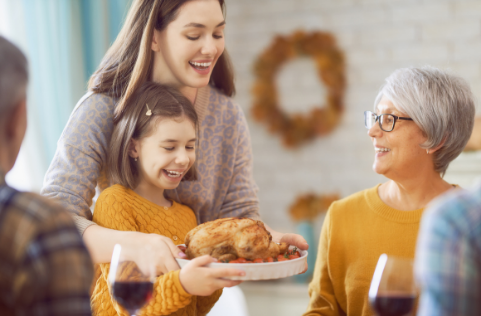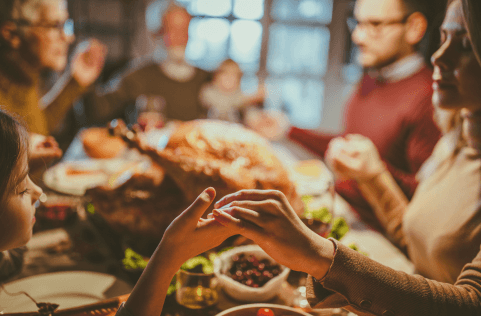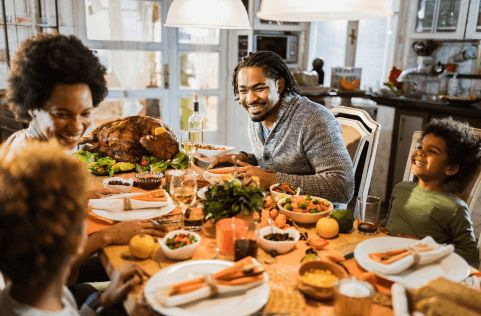When you sit down at the Thanksgiving table and the aromas of freshly baked bread, an oven-roasted turkey, or a sweet apple pie fill your nose, what do you feel? Is the vision of the food on the table overwhelming? Does the notion of feeling full after a meal make your heart race? If so, we hear you and encourage you to keep reading, because this post is for you.
While holidays are typically filled with festive foods that bring everyone together, we understand that for someone who may be in the midst of their journey towards intuitive eating, or who is recovering from an eating disorder, Thanksgiving may be more frightening than festive. You are definitely not alone in this.
Here at NourishRX, we want you to be able to enjoy the holidays to the fullest - and one step is working to normalize fullness this Thanksgiving.
As with most things, the joy that comes with the holiday season unfortunately comes with a side of diet culture and diet talk. Part of this conversation centers around the idea that feeling full is bad and should be avoided. Many of our clients have learned to fear their fullness and that if they ever reach a point of fullness or even *gasp* uncomfortable fullness then they have failed.
However, we are here to validate and reinforce that this couldn’t be further from the truth. Fullness plays an important role and happens for a reason - let’s break it down a little further.

what is fullness?
Fullness is a normal body sensation that happens throughout the day, multiple times per day to help ensure we are getting adequate nutrition into our daily lives.
Fullness is partly controlled by the hypothalamus, your blood sugar, and having food in your stomach and intestines. Fullness is also typically accompanied by bloating as your stomach expands which, again, is totally normal.
It is important to note that when in eating disorder recovery or working towards an improved relationship with food, your fullness cues may not always be the most accurate. Slowed gastric emptying and overall slower gastrointestinal (GI) motility is a common side effect of restrictive eating and can impact how quickly you are feeling full during a meal. We encourage you to talk with your team about this if you are experiencing any signs or symptoms of early satiety (feeling full very quickly).
Outside of a physical feeling - fullness can also mean feeling emotionally or spiritually full. It often accompanies memories, fun conversations, building new traditions, and maybe seeing people that you haven’t seen for a year or more.
We encourage you to re-frame what fullness means this holiday season and work through the shame and guilt that may come up for you when experiencing this feeling. Let’s work together to help you start to normalize fullness this Thanksgiving.
4 steps to take to normalize fullness
Remember the reasons for eating are not always physical
Sure, sometimes we are ready to eat when our stomachs are grumbling or when we start feeling “hangry.” These are signs of physical hunger. But, would you believe me if I told you that emotional hunger is just as good of a reason to eat as physical hunger? Diet culture may say, “only eat when you’re hungry,” but we know that food serves much more of a purpose than just to make your stomach stop growling.
Eating for social, emotional, or cultural reasons fall under the umbrella of Normalized Eating. Food is something that brings people together; something that holds tradition and cultural significance for many. Thanksgiving is a perfect example of this! Remember that the food in front of you is bringing everyone together, and serves a bigger purpose than just diminishing physical hunger.
Fullness is normal and temporary
Your body was physically built to process food - to take out all the nutrients that it needs, to digest it, and to discard the waste. Your gastrointestinal tract is constantly working to complete this process. Fullness is simply a response to food intake throughout the day. We tend to underestimate what the body is capable of but we’re here to tell you that your GI tract is pretty good at its job - it can process food quickly and efficiently.
With this, feeling bloated or feeling the need to unbutton your pants might come, but this is normal. Remember - when we eat food, our stomachs expand, and that is okay and expected. And guess what?
This feeling is temporary.
Holding onto that phrase during your post-Thanksgiving meal moments can be helpful in neutralizing thoughts around fullness. Eventually the GI tract does its thing, the food is digested and absorbed and your body will be ready to take in more energy. Let’s repeat it one more time: this feeling is temporary.

feeling fullness means that you are connecting to your body's cues
Diet culture does a great job of telling us that feeling full is a bad thing; that you shouldn’t eat past the point of fullness. We say “au contraire!”
Feeling fullness means that you are actually tuning into your body’s fullness cues, which is a key part of the journey towards Intuitive Eating! Feeling those fullness cues means that you are learning to communicate with your body, which is a good thing.
How would it feel to approach fullness from an observational point rather than a place of judgement? Observing that you are able to notice and connect to these cues and how they feel for you in this moment helps you start to understand your body a little more.
Normal eating is fluid - our bodies can handle fluctuations in our eating
Now, we’ve said it before but we’ll say it again - our bodies are resilient. They can handle fluctuations in our eating, and can certainly handle eating past the point of fullness. Remember, it is totally normal if needs and intake vary on a daily basis. Having an extra serving of grandma’s pumpkin pie or your neighbor’s stuffing because it just sounded good does not mean that you have failed your body. Your body is tough and can process the energy that it is provided.
Again, what if we used this as a moment of curiosity and were able to observe our body’s ability to handle fluctuations and move through fullness without judgement? If this feels weird or difficult that’s okay. Normalizing fullness comes with a side of discomfort which is not always fun. However, as you work to heal your relationship with food we believe that change starts to happen when you are able to feel the discomfort, sit in it, and do it anyways.

let's enjoy the holidays together
As we enter into the holiday season know that fullness may be a part of the day. How would it feel to expand your view outside of just scrutinizing body cues or food intake and instead work to focus on the holiday, on family and friends. Your body will naturally take care of the rest. To wrap things up, we’ve included some neutral phrases below for you to pull from during or after your Thanksgiving (or any) meal to help to normalize fullness. Take and use what feels good for you:
- This feeling will pass or this feeling is temporary
- My body knows what to do with the food I provide it
- Feeling fullness is normal
- I am connecting to my body cues
- I can listen to my body
If you need a little extra help, we’re here too. Remember, you are not alone in this journey, our team is here to support you through this.
You deserve to feel comfortable during the holiday season (and always)!
Comments Off on How to Normalize Fullness this Thanksgiving